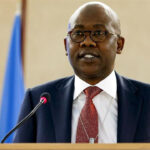
On his first visit to Africa last week, US Secretary of State Rex Tillerson warned African countries to protect their sovereignty from the allure of cheap Chinese loans.
“We are not in any way attempting to keep Chinese ‘dollars’ from Africa,” he said in Ethiopia on Thursday, calling on African countries to “carefully consider the terms of those agreements and not forfeit their sovereignty.”
Mr. Tillerson said that Chinese investments “do not bring significant job creation locally” and criticized how the country structures loans to African governments, saying if a government accepts a Chinese loan and “gets into trouble”, it can “lose control of its own infrastructure or its own resources through default.”
The warning followed an incident in January in which US President Donald Trump was reported as having called Haiti and African states “sh*thole” countries. Trying to soothe African anger, Mr. Tillerson had said at a news conference in Canada afterwards that the US shared cooperation with African nations on many issues, adding, “I think those leaders know that the United States wants that relationship to continue to be strong.”
Given that the US has lost some political and economic presence to China because of China’s splashy economic activity in recent years, it is easy to dismiss Mr. Tillerson’s warning as mere self-interest, but if any country ought to listen, it is Nigeria.
Sadly, Nigeria may be the last to listen, as she has borrowed indiscriminately from that country, but does not know how much, or where it is. In April 2016, President Muhammadu Buhari traveled to China to conclude a loan deal of $2bn for infrastructure. His government has worked strenuously since then to obtain legislative approval of another $30bn, most of it from China.
In August 2015, months after he took office, he had demanded that the Ministry of Finance explain why a $1 billion Chinese loan meant for the Lagos-Kano rail line had been “redirected” to other projects, as only $400 million of the money allegedly remained.
It is unclear that he ever obtained that explanation, given the other developments on the China file since then, and the often confused outlook of his government. As I have previously explained in this column, the loan about which he sought that the explanation was approved by the federal cabinet in July 2012.
President Goodluck Jonathan traveled to Beijing in July 2013 to conclude the $3bn loan, which was reportedly aimed at four new airport terminals; the Abuja light rail project; agriculture; the Bauchi Independent Power project; completion of the Galaxy backbone project; and some Niger Delta infrastructure. If you know any of them that was undertaken or completed, please identify them.
That was the prime era of Chinese loans, and there was a lot of freewheeling collaboration between Nigerian officials and Chinese companies.
According to Ngozi Okonjo-Iweala, who was the Finance Minister at the time, there had arisen an embarrassing practice of Nigerian government scrambling to obtain “cheap” Chinese loans. In some cases, Chinese companies arrived in Nigeria first to pitch projects to different ministries and agencies, and then offered to negotiate the credit.
And why not? According to her Ministry of Aviation counterpart, Stella Oduah, who supervised a $500m loan for those five airport terminals, it was “almost free” money.
If it is easy, and almost free, there is perhaps a catch. But it was also a period in which, according to President Goodluck Jonathan in an infamous gaffe, stealing was not corruption. That was why, when President Buhari took power-and believing he was sincere about arresting the rot-I urged him in this column on August 23, 2015, to order the Ministry of Finance and the Debt Management Office to provide him with their China dossiers, citing a plethora of MOUs, negotiations and agreements.
Where, for instance, is the $20 billion project for 20,000 megawatts of electricity capacity that Nigeria signed with Power Construction Corp. of China in July 2013 during Mr. Jonathan’s visit, which was reported by Bloomberg News?
Where is the $1.07 billion road contract that the Ministry of Delta Affairs signed with China Railway Construction Corp. Ltd. (CRCC) in November 2013? Designed to be completed within five years, is it (almost) ready?
CRCC was also the recipient of another major contract, in November 2014, for the $11.97bn, 1402-kilometer Lagos-Calabar railway. The Buhari government says it has renegotiated it. In February 2017, an industry source, The Structural Engineer, reported the new contract completion to be set for 2018.
Speaking during a visit to Nigeria last year, Wang Yi, China’s Foreign Affairs Minister, said his country would invest an additional $40 billion in Nigeria. Added Geoffrey Onyeama, his Nigeria counterpart, “China has already invested or financed a total number of $22 billion projects here in Nigeria, another $23 billion projects are on-going.”
These are astonishing amounts of money, but does Buhari know about them, or about the projects they are supposedly financing? What and where are they? Do we care about our responsibility for those loans?
Tillerson assured on Tuesday that Washington was not trying to keep Chinese investment away from Africa, but noted that China “encouraged dependency, utilized corrupt deals and endangered Africa’s natural resources.”
Nigeria ought to listen, and ought to be careful, particularly now that the Chinese are tightening up their lending to Nigeria. In mid-2016, as Nigeria chased a $20bn facility from the China EXIMbank, she came up against a brick wall, the Chinese demanding the right to supervise all funds released to Nigeria. This point-reminiscent of Switzerland seeking reassurances before releasing recovered loot to Nigeria-rather than the Nigerian legislature, is probably the true explanation for why current loan efforts have stagnated.
In this regard, it is interesting to recall that in May 2017, Nigeria named a consortium, led by General Electric (GE) of the US, to handle a concession for the Nigerian Railway Corporation. But making the announcement, GE was curiously careful about its language, speaking only about having received “a Letter of Award confirming its selection as the preferred” bidder.
“With this award letter, the Consortium is in the negotiation phase of the concession process with the Federal Government to finalize terms and condition and other pertinent details,” GE whispered.
The matter had an interesting background. In mid-September 2016, Minister of Transportation Rotimi Amaechi told NAN of negotiations for the concession of narrow gauge lines in the country to GE, and that “they are bringing in 2 billion dollars” for the project.
Two weeks later, in his Independence Day speech in October 2016, President Buhari affirmed: “…General Electric is investing $2.2bn in a concession to revamp, provide rolling stock, and manage the existing [rail] lines…”
Not true, GE responded, its chief executive in Africa Jay Ireland immediately telling the Financial Times Africa Summit in London the company planned investment only of $2bn in Africa in the coming years, and only $150m in Nigeria by 2017.
Despite all of that, just two weeks ago, Vice President Yemi Osinbajo declared at the Lagos-Kano Economic and Investment Summit GE wants to invest $2 billion in a concession to revive the Lagos-Kano Rail Line.
Something, clearly, is fiction. The real fear is how much fiction there is in the China file.
• Twitter: @SonalaOlumhense



